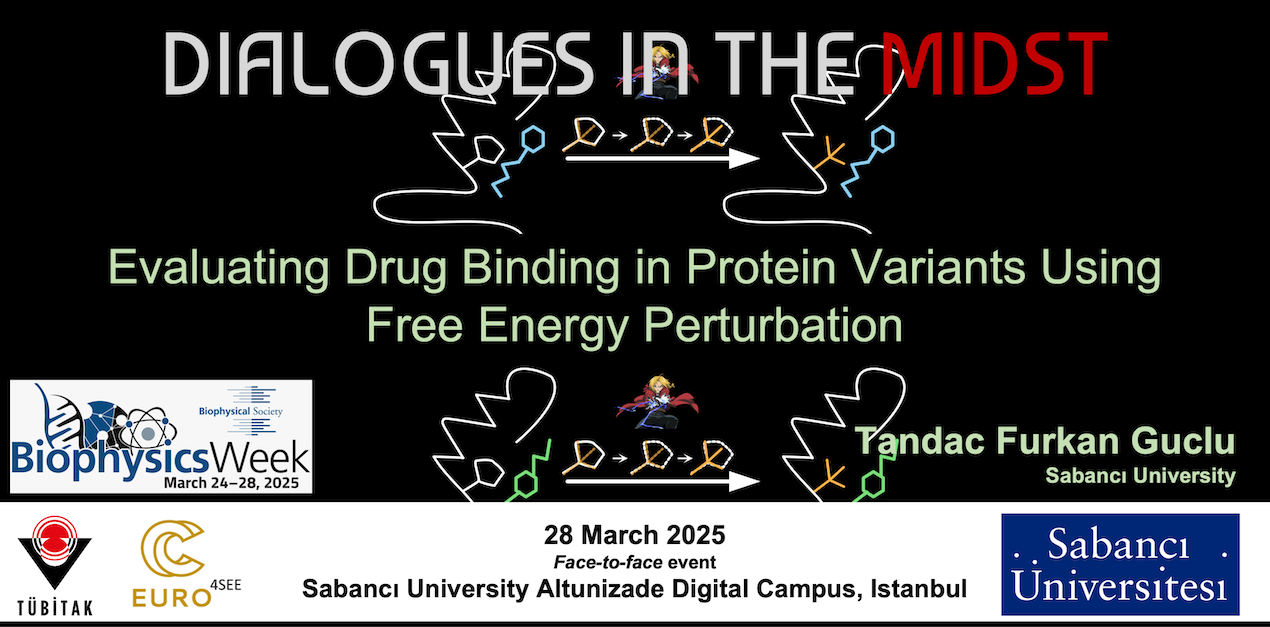
Language: English
Organiser: Sabancı University
Format: Face-to-face (Sabancı University- Altunizade Digital Campus, İstanbul)
Level: Intermediate
Prerequisites: Participants are expected to have a knowledge of protein structure and minimal experience with molecular dynamics simulations.
Topic: Computational Biology
General Information: Computing the binding energy of a drug against a mutation can be challenging and prone to error. Moreover, many models (docking [1], FoldX [2], Rosetta [3], etc.) and deep learning tools (AlphaFold3 [4], DeepDTA [5], etc.) yield protein–drug complexes and energies with limited precision and explainability. Here, we employ free energy perturbation (FEP), a simulation method in which mutational perturbations are applied stepwise to an amino acid in a protein structure by annihilating the wild-type residue and creating the mutation—hence the term “alchemistry.” Because both the initial and final conformations are physical, this method enables the calculation of mutation and relative binding energies with high precision.
In this workshop, we use the enzyme dihydrofolate reductase (DHFR), a model protein for antibiotic resistance studies as an example system. We will perform FEP simulations on single mutational variants of DHFR bound to two drugs, TMP and 4'DTMP, and calculate the relative binding energies to determine the more favorable drug. This workshop will combine theory and application. In the morning, we will first learn about the fundamentals of FEP simulation and how to perform these simulations on a high-performance computer (TRUBA), after which we will run an FEP simulation on TRUBA. Each attendee will also run an FEP simulation using their temporary account. In the afternoon, we will discuss thermodynamic cycles, how to calculate relative binding energies, and how to analyze the FEP simulations. We will examine the outputs in depth through the lenses of computation, biophysics, and evolution.
[1] https://doi.org/10.1002/jcc.21256
[2] https://doi.org/10.1093/nar/gki387
[3] https://doi.org/10.1093/bioinformatics/btq007
[4] https://doi.org/10.1038/s41586-024-07487-w
[5] https://doi.org/10.1093/bioinformatics/bty593
Related DHFR references:
- https://doi.org/10.1093/molbev/msz086
- https://doi.org/10.1021/acs.jcim.3c00818
- https://doi.org/10.1002/cpe.8371
Trainer: Dr. Tandaç Furkan Güçlü, Sabancı University, Molecular Biology, Genetics and Bioengineering
Contact: ncc@ulakbim.gov.tr
- X: https://twitter.com/EuroCC_Turkey
- LinkedIN: https://www.linkedin.com/company/eurocc-turkey
- YouTube: https://www.youtube.com/c/EuroCCTurkey